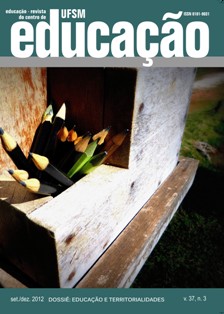Childhood facing technological development: a study on child social representation
DOI:
https://doi.org/10.5902/198464443107Keywords:
Child, Technologies, Social representations.Abstract
The research that led to this study aimed to understand the meaning attributed to childhood in a world fulfilled by information technologies, especially the digital ones. The article proposes the analysis of social representations shared by children 200 teachers from public schools in Recife-PE, in order to understand the social meaning of the word child, propagated and used as reference system to guide people in their relationships with this group of people. The data collection instruments used was tests of free association. W ith the support of Trideux software and the Content Analysis, the analyzes of associations were done. The results show some aspects that seem to perpetuate themselves in relation to definition of a child, such as playing, going to school and have good feelings. In relation to technology is evidenced playful dimension of these resources and training.Downloads
Published
How to Cite
Issue
Section
License
Declaration of originality
We declare that all articles present in the journal Educação (UFSM) are originals and were not submitted for publishing on any other publication, as a whole or a fraction. We also declare that, after being published by Educação (UFSM), a paper will not be submitted to another journal within two years. After this time, our journal transfers the publishing rights to the authors, with a permit granted by the Editorial Council.
We also acknowledge that the originals’ submission to Educação (UFSM) implies on a transference of copyright for physical and digital publishing to the journal. In case of noncompliance, the violator will receive sanctions and penalties predicted by the Brazilian Copyright Protection Law (n. 9610, dated 19/02/98).
Attribution 4.0 International (CC BY 4.0)
This license lets others remix, transform, and build upon the material for any purpose, even commercially, and copy and redistribute the material in any medium or format.

This work is licensed under a Creative Commons Attribution 4.0 International (CC BY 4.0)






